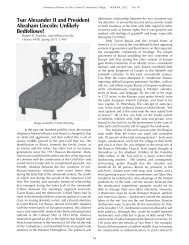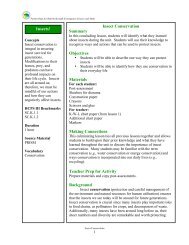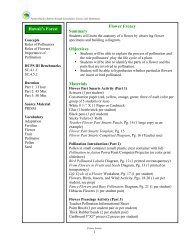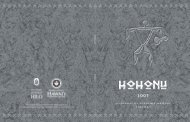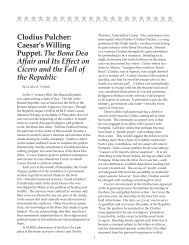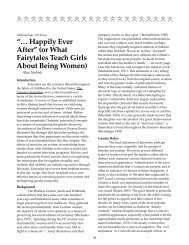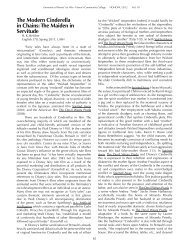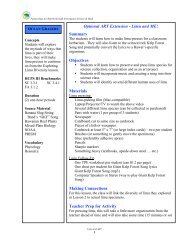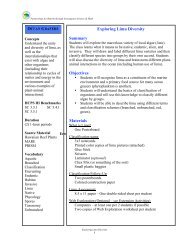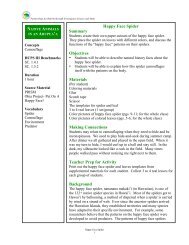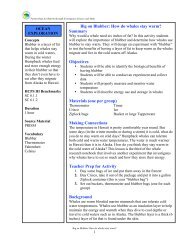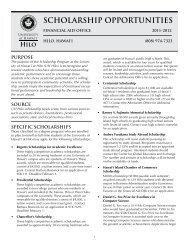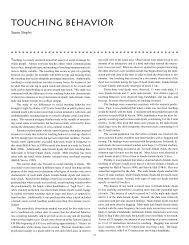A JOURNAL OF ACADEMIC WRITING VOLUME 8
A JOURNAL OF ACADEMIC WRITING VOLUME 8
A JOURNAL OF ACADEMIC WRITING VOLUME 8
You also want an ePaper? Increase the reach of your titles
YUMPU automatically turns print PDFs into web optimized ePapers that Google loves.
Taylor opened with comments that suggested the Nazi Doctors<br />
had turned Germany into a “lunatic asylum and a charnel<br />
house.” 20 It is a common notion that the Nazis abandoned<br />
ethics and created a bad name for German science. Is it true<br />
to believe that Nazi’s really abandoned ethics, and if they did,<br />
would that make their experiments bad science? It depends on<br />
what “bad science” really is and if abandoning ethics is the only<br />
determining factor in creating “bad science.” Whether people<br />
want to accept the experiments or not, they have been done<br />
and they cannot be discounted. From the stand of morals and<br />
ethics they were unacceptable, but from the stand of science<br />
and technology they are advancement: “[a]lthough the data is<br />
morally tainted and soaked with the blood of its victims, one<br />
cannot escape confronting the dreaded possibility that perhaps<br />
the doctors at Dachau actually learned something that today<br />
could help save lives or ‘benefit’ society.” 21<br />
The argument that Nazi experiments are to be considered<br />
“bad science,” could be relevant when discussing the health<br />
of the patients. Experiments were done on the prisoners<br />
considered to be healthy, which means that they were not as<br />
wasted away as the rest. However, all the prisoners were “usually<br />
malnourished, emaciated, and severely weakened, and thus<br />
their physiological responses to the experiments would likely be<br />
different from those of normal, healthy people.” 22 It is easy to<br />
believe that the patients were more susceptible to diseases and<br />
illnesses since they were malnourished. Yet, if they were so sick,<br />
how did so many survive? Would you call the survivors lucky,<br />
or were they the results of “good science?” It would be easier<br />
to claim the experiments to be pseudoscience if there were no<br />
survivors.<br />
If data discovered by the Nazi’s in their sadistic<br />
experiments could be used to save others, should that data<br />
still be disregarded because of ethical issues? Wouldn’t that<br />
now become a new ethical problem if doctors denied care to a<br />
patient because the data came from Nazi experiments? Who is<br />
now considered unethical? Arguably, if the Nazi experiments<br />
were so horrific, then only in a case where the denial of medical<br />
attention becomes an immense objective and, ultimately, a<br />
greater ethical issue than the experiments itself, the data could<br />
then be used.<br />
An article from the Jewish Virtual Library called “The<br />
Ethics of Using Medical Data from Nazi Experiments,”<br />
acknowledged an analogy of using “tainted” or “bad” medicine.<br />
Cohen pointed out a scenario with two patients in the hospital:<br />
Patient A is on the verge of death and Patient B is awaiting a<br />
20 Proctor, Robert N. “Nazi Science and Nazi Medical Ethics: Some Myths<br />
and Misconceptions.” Perspectives in Biology and Medicine, (2000) 335-<br />
346.p.335<br />
21 American-Israeli Coopertive Enterprise, Jewish Virtual Library, 2009.<br />
(accessed April 20, 2009) http://www.jewishvirtuallibrary.org/jsource/<br />
Holocaust/cclist.html.<br />
22 PBS. Holocaust on Trial. 2000. (accessed February 11, 2009) http://www.<br />
pbs.org/wgbh/nova/holocaust/experiintro2.html.<br />
possible heart transplant from A. Suppose the doctor did not<br />
wait until A died and removed his heart anyway. Do you now<br />
throw the heart away because it was taken in the act of murder<br />
or do you save B’s life with the murdered heart? Keeping both A<br />
and B in mind, and ethically-knowing that the doctor killed A,<br />
should he let B suffer and die because of it? Suppose the doctor<br />
transplanted the heart into B, is he now A’s killer and B’s hero?<br />
Where do you draw the line in medical ethics? 23<br />
Using the data from the Nazi medical experiments has<br />
been a taboo issue because many believe that using the data will<br />
validate the torture and inhumanity, sending a message that<br />
what the Nazi’s did was “okay.” This could potentially make<br />
those using the data responsible for disrespect and dishonor to<br />
the victims. One Holocaust survivor said, “As much as I am for<br />
scientific research for the betterment of humanity, I do feel that<br />
the scientific data collected from experiments done on inmates<br />
of Nazi concentration camps should not be used. If I would<br />
agree, I feel I [would] give a stamp of approval to the ways and<br />
means [these] experiments have been conducted and quasilegalize<br />
[them].” 24<br />
Arguably, not using the experiment data may suggest<br />
that the victims died for no reason and their suffering meant<br />
nothing. Another Holocaust survivor stated that, “It appears<br />
that, at least in some cases, there was an attempt to induce<br />
illness by injecting bacteria and then an attempt to cure these<br />
illnesses. [T]hat is to say, we served as laboratory animals in<br />
the hands of the criminal, Mengele, and this type of research<br />
should, of course, be made available to the world.” 25<br />
There is no direct link in data that compares modern<br />
vaccinations to the pharmaceutical experiments of the Nazi’s;<br />
however, the notion that Nazis directly contributed data<br />
to modern-day vaccinations is not farfetched. If the Nazi<br />
experiments did help with modern vaccinations and the<br />
evidence was available, would it be fair to discontinue the<br />
vaccinations in honor of the Holocaust victims?<br />
Although many Jewish people suffered as the Nazis<br />
used their bodies in sadistic experiments, much of the data<br />
discovered could potentially be used in modern medicine<br />
to save many lives today. It has been over 70 years since the<br />
atrocities and while the past is not erasable, what is done is<br />
done and respect is all that can be given. Every individual will<br />
choose his own path in the controversy and will either use, or<br />
discount, the Nazi experiment data, whether or not lives can be<br />
saved: “[w]hat occurred in the Nazi concentration camps has<br />
23 American-Israeli Coopertive Enterprise. Jewish Virtual Library. 2009.<br />
http://www.jewishvirtuallibrary.org/jsource/Holocaust/cclist.html<br />
(accessed April 20, 2009).<br />
24 Anonymous survivor of Dr. Josef Mengele’s twins experiments at<br />
Auschwitz. PBS. Holocaust on Trial. 2000. (accessed February 11, 2009)<br />
http://www.pbs.org/wgbh/nova/holocaust/experiintro2.html.<br />
25 PBS. Holocaust on Trial. 2000. (accessed February 11, 2009) http://www.<br />
pbs.org/wgbh/nova/holocaust/experiintro2.html.<br />
HOHONU Volume 8 2010 - 15



